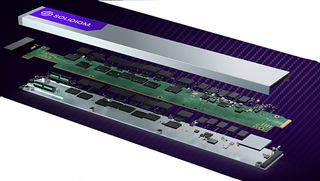This 61TB homebrew hack nukes the Steam Deck's storage 'problem' from orbit
Just enough space to install Call of Duty: Modern Warfare 3...

Following news that Call of Duty: Modern Warfare 3 requires about 65 dodectillion petabytes of storage space for a full install (actually 213GB for the full visual experience), comes this rather well endowed Steam Deck with a 61TB upgrade and the exciting prospect of being able to have more than one Triple-A space installed at the same time.
The biggest factory-spec Deck you can buy from Valve is the 512GB model, which in theory could limit you to a single game install on the basis of that ludicrous 213GB CoD install and the idea that you'll need some space for the OS and a few other bits and pieces. Of course, not all games are as demanding as that. And, realistically, you're not going to go with the "high-rez assets cache" that demands 64GB on a Deck.
So, the real-world storage limitation on the Deck isn't nearly that acute. But it can still be a bit of an issue in this era of 100GB-plus titles. And if you're going to solve it, well, you may as well really solve it, right? So, forget that 2TB upgrade. We're going all the way to 61TB.
Well, not actually we, but website Storage Review. They've nuked the Deck's factory-spec storage limits from orbit courtesy of an M.2 to U.2 adapter, allowing for the installation, ish, of a Solidigm P5336 61.44TB drive, the sort of thing you'd normally find in a server farm.
Now, this doesn't make for a terribly ergonomic solution. Apart from having to run with the rear casing removed and a huge cable sticking out the back, the Solidigm drive's power requirements mean that it needs to be hooked up to an ATX PSU of its own. So, let's just say the Deck's portability is slightly compromised. But that's one way to solve the battery life problem.

Anywho, Storage Review found sequential performance increased with the slight spec bump on the SSD compared to the factory 256 drive. But the 4K random reads actually took a bit of a hit.

Best SSD for gaming: The best speedy storage today.
Best NVMe SSD: Compact M.2 drives.
Best external hard drives: Huge capacities for less.
Best external SSDs: Plug-in storage upgrades.
It's all fairly academic, but as for the sordid matter of money, well, it's a case of if you have to ask, you definitely can't afford it. And if you really must insist on asking, you're looking at something in the order of $3,500 for the drive.
The biggest gaming news, reviews and hardware deals
Keep up to date with the most important stories and the best deals, as picked by the PC Gamer team.
Back in the real world, the only problem with the Deck is that it uses to compact 2230 M.2 spec, not the more usual and longer 2280 M.2 spec. Inevitably, the smaller form factor is a bit pricier, though not ridiculously so.
As you can see on our SSD deals page, a regular M.2 2280 2TB can be had for under $100, while a 2TB 2230 drive is more like $140, allow you to install at least six or seven Call of Duty: Modern Warfare 3 style space hogs. What a wonderful time to be alive.

Jeremy has been writing about technology and PCs since the 90nm Netburst era (Google it!) and enjoys nothing more than a serious dissertation on the finer points of monitor input lag and overshoot followed by a forensic examination of advanced lithography. Or maybe he just likes machines that go “ping!” He also has a thing for tennis and cars.
Most Popular







